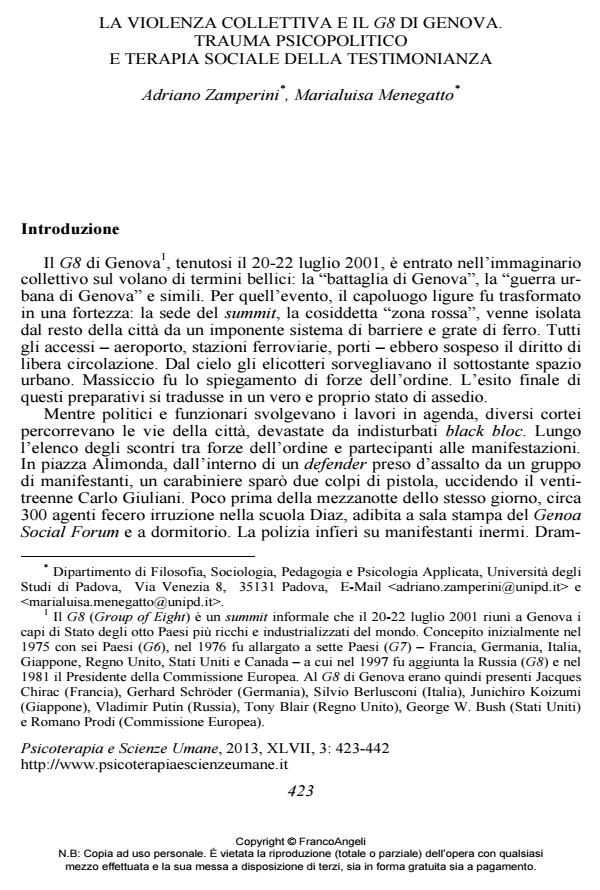Collective violence and the Genoa G8 summit. Psycho-political trauma and social therapy of testimony.
Journal title PSICOTERAPIA E SCIENZE UMANE
Author/s Adriano Zamperini, Marialuisa Menegatto
Publishing Year 2013 Issue 2013/3
Language Italian Pages 20 P. 423-442 File size 113 KB
DOI 10.3280/PU2013-003002
DOI is like a bar code for intellectual property: to have more infomation
click here
Below, you can see the article first page
If you want to buy this article in PDF format, you can do it, following the instructions to buy download credits

FrancoAngeli is member of Publishers International Linking Association, Inc (PILA), a not-for-profit association which run the CrossRef service enabling links to and from online scholarly content.
State violence generally is connected to totalitarian regimes and dictatorships that violate human rights. Conversely, scientific literature is poor in state violence practiced in democratic societies. The aim of this article is to fill this gap by analyzing the events occurs during the G8 summit in Genoa of July 20-22, 2001, during which, according to international observers, there has been the most serious suspension of human rights in a Western country after World War Two. Through a criticism of the diagnosis of Post-Traumatic Stress Disorder (PTSD), by articulating the concepts of social delegitimization, psychopolitical trauma, and therapy of testimony, a contextual analysis of the trauma suffered by victims during the violence of the G8 summit is suggested.
Keywords: State violence, psycho-political trauma, social delegitimization, Post-Traumatic Stress Disorder (PTSD), disability
- Psicologia e genocidio. Nascita di una professione in rwanda Adriano Zamperini, Marta Bettini, in PSICOTERAPIA E SCIENZE UMANE 1/2015 pp.71
DOI: 10.3280/PU2015-001004 - Accountability and Police Violence: a Research on Accounts to Cope with Excessive Use of Force in Italy Adriano Zamperini, Valentina Siracusa, Marialuisa Menegatto, in Journal of Police and Criminal Psychology /2017 pp.172
DOI: 10.1007/s11896-016-9208-7 - Un lutto speciale. Delegittimazioni culturali e rappresentazioni della morte nella perdita di un animale domestico Ines Testoni, Loriana De Cataldo, in PSICOTERAPIA E SCIENZE UMANE 3/2017 pp.413
DOI: 10.3280/PU2017-003004 - Representations of death among Italian vegetarians: An ethnographic research on environment, disgust and transcendence Ines Testoni, Tommaso Ghellar, Maddalena Rodelli, Loriana De Cataldo, Adriano Zamperini, in Europe’s Journal of Psychology /2017 pp.378
DOI: 10.5964/ejop.v13i3.1301 - ‘Study like Italians do’ as a migration project: field research in Togo Adriano Zamperini, Alberto Mascena, in Ethnography and Education /2017 pp.271
DOI: 10.1080/17457823.2016.1231073 - Testimony of terrorism: Civic responsibility and memory work after a political massacre Adriano Zamperini, Letizia Passarella, in Memory Studies /2019 pp.721
DOI: 10.1177/1750698017720255
Adriano Zamperini, Marialuisa Menegatto, La violenza collettiva e il g8 di Genova. trauma psicopolitico e terapia sociale della testimonianza in "PSICOTERAPIA E SCIENZE UMANE" 3/2013, pp 423-442, DOI: 10.3280/PU2013-003002